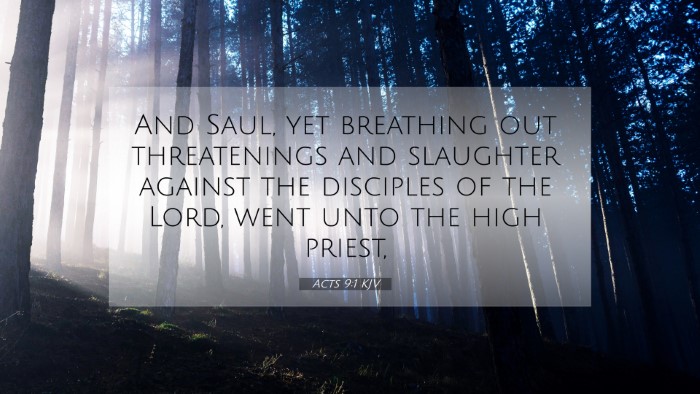Understanding Acts 9:1
Acts 9:1 states: “And Saul, yet breathing out threatenings and slaughter against the disciples of the Lord, went unto the high priest.” This verse is pivotal as it introduces Saul of Tarsus, a key figure in the early development of Christianity, marking the beginning of his aggressive persecution of Christians before his dramatic conversion. Below we explore its meanings and connections.
Verse Meaning and Interpretation
In this verse, we see several critical themes:
- Saul's Zeal: Saul's fervor in persecuting the early Christians suggests a deep-rooted passion for Judaism and a misunderstanding of Jesus' message. Both Matthew Henry and Albert Barnes highlight that Saul's actions were motivated by what he perceived as a defense of his faith.
- Opposition to the Gospel: Saul's threats against the disciples signify the fierce resistance that the early church faced. Adam Clarke elaborates on this aspect, indicating that such opposition was expected as part of living out the Christian faith during that time.
- High Priest's Role: Saul's approach to the high priest signifies institutional approval for his actions. It underscores a powerful alliance between the Jewish religious authorities and those opposing the nascent Christian movement.
Bible Verse Cross-References
Acts 9:1 finds relevance in various other scriptures, showcasing its thematic connections:
- Acts 7:58: The stoning of Stephen marked an important moment that fueled Saul’s later actions.
- Acts 8:1: Saul’s approval of Stephen's execution highlights his role in early persecution.
- Philippians 3:6: Paul (formerly Saul) describes himself as “zealous for the traditions” concerning the law, reinforcing his fervent approach to Judaism.
- 1 Timothy 1:13: Paul himself acknowledges his past, emphasizing the grace shown to him despite his previous actions.
- Acts 22:4-5: Paul recounts his persecution of the church, offering insight into his mindset during this early period.
- John 16:2: Jesus foretells that those who kill will think they are serving God, reflecting Saul's mindset.
- 2 Corinthians 5:17: This verse indicates transformation, contrasting with Saul’s prior way of life, showcasing the drastic change in his identity.
- Romans 10:2: Paul explains that he had zeal without knowledge, linking back to his actions in Acts 9:1.
- Galatians 1:13-14: Paul discusses his previous life in Judaism, further illustrating his passionate resistance against the early believers.
- Acts 26:9-11: Gives an account of Saul’s intense opposition to Christians, illuminating the context of Acts 9:1.
Thematic Bible Verse Connections
The themes present in Acts 9:1 resonate throughout the Bible:
- Persecution and Faithfulness: Similar challenges faced by biblical figures like Job (Job 30:26) and the prophets (Jeremiah 20:2) draw connections to the early church’s trials.
- Transformation through Grace: The journey from Saul to Paul is echoed in various passages like Ezekiel 36:26, which speaks of a new heart being given.
- Divine Intervention: The miraculous nature of Saul’s conversion (Acts 9:3-9) foreshadows other accounts of divine encounters (Isaiah 6:1).
Comparative Bible Verse Analysis
When comparing Acts 9:1 to other accounts of early Christian persecution, we can see clear parallels:
- Matthew 5:10-12: The Beatitudes reflect the blessedness of those persecuted for righteousness' sake, suggesting a counter-narrative to Saul’s actions.
- Luke 6:22: Jesus states that persecuted individuals will experience joy; Saul’s actions sharply contrast this promise.
- Revelation 2:10: The exhortation to remain faithful even in persecution ties directly to the experiences of the early Christian community targeted by Saul.
Conclusion
In conclusion, Acts 9:1 is rich in meaning and connections to other scriptures. By understanding Saul’s motivations, the institutional support for persecution, and the subsequent transformation he underwent, one can appreciate the complexity of early Christian history. This verse serves as a notable reference point for thematic studies on persecution, zeal, and transformation, providing ample opportunities for cross-referencing and deeper study within the Biblical text.
Tools for Bible Cross-Referencing
For those interested in exploring the connections and deeper meanings found in the Bible, here are some useful tools:
- Bible concordance
- Bible cross-reference guide
- Cross-reference Bible study methodologies
- Bible reference resources
- Interactive Bible study tools
Further Study Recommendations
To enhance understanding and enrich study, consider:
- Identifying connections between Old and New Testament
- Detailed thematic studies utilizing cross-referenced resources
- Exploring similarities between other biblical figures’ experiences with zeal and conversion












